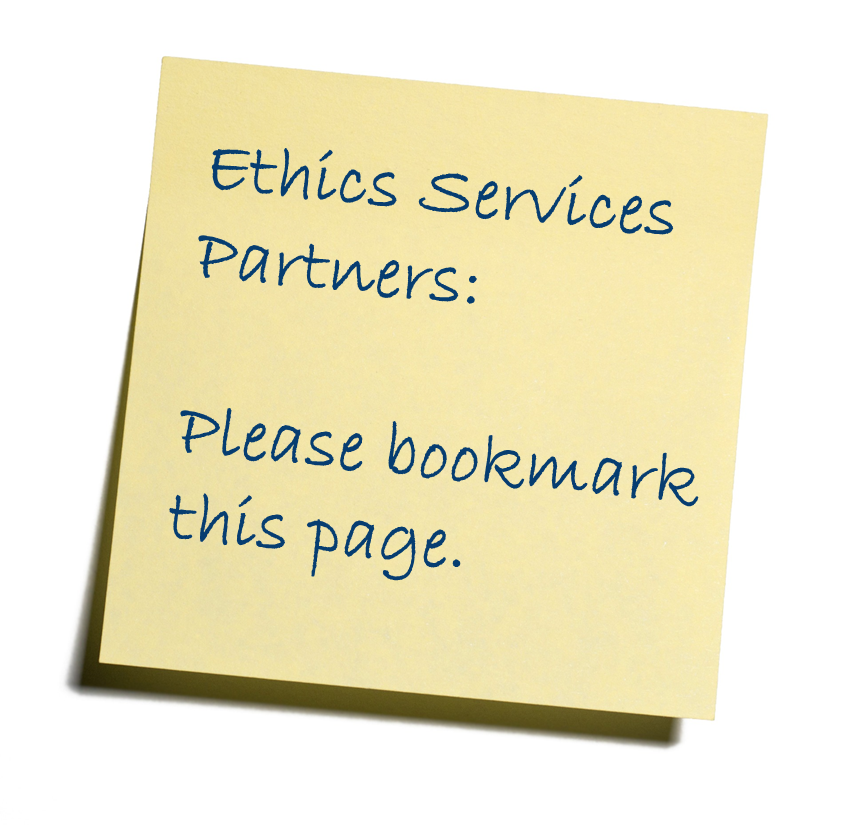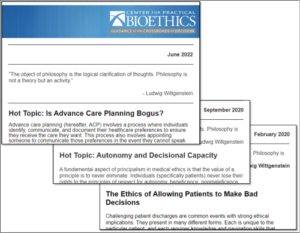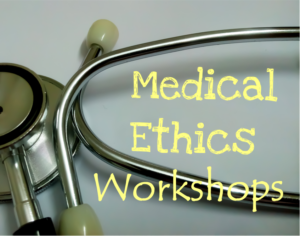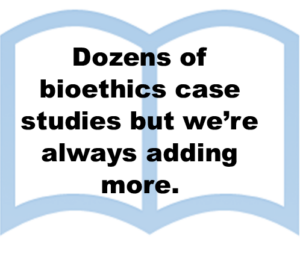
Ethics Committee Consortium Resources

The Ethics Committee Consortium (ECC) is the nation’s oldest continuously operating consortium of its kind. ECC benefits are available to all Center Partner Organizations’ employees and volunteers. Nearly 500 individuals participate in the ECC, who represent approximately 300 ethics committees serving hospitals, hospices, health systems and other providers.
ECC Webinar Series
The ECC Webinars are monthly webinars on a range of topics from introductory training for new ethics committee members to case retrospectives and discussions on emerging issues in healthcare. ECC members receive emails about upcoming webinars which are hosted live via conferencing on the second Thursday of each month at 12 noon CT / 1 pm ET. If you are unable to attend, no worries, we send you a recording link to view or come to this page any time.
Medical Ethics Immersion Workshops
Periodically, Consortium members are invited to attend ethics committee skills development workshops. The Center will invite you via email to register for these free workshops which are recorded so the recording link may be sent to all members who register. Not on the Consortium email list, but belong to a partner organization? Please email Monica Delles, at mdelles@practicalbioethics.org.
Ethics Committee Handbook
As a Consortium member, you can download this handbook designed to orient new committee members. Topics include: morality and ethics, the changing face of medicine, educating ourselves and others, case consultations, and policy review and development.

Consortium Membership
The ECC provides practice-oriented bioethics education that addresses clinical and non-clinical ethics consultation, healthcare policy review, and clinical ethics research support. ECC membership applies to all employees and volunteers of organizations who have a Partner Agreement with the Center. ECC membership includes:
• 10 monthly educational webinars throughout the year
• Ethics Dispatch monthly e-newsletter, offering guidance on ethical issues, case studies and ethical musings
• Medical Ethics Immersion Workshop Series
As of 2023, nearly 500 individuals participate in the ECC – including acute care and hospice care workers, doctors, nurses, surgeons and academics – representing more than an estimated 300 ethics committees.
Ethics Committee Consortium History
The first hospital ethics committees in the nation were established in the 1970s, and the primary catalyst for their growth was the 1976 Karen Quinlan case. As the case was argued, the judge, who had read an article about ethics committees in the Baylor Law Review, remarked that cases like this belong before ethics committees rather than courts.
In 1992, the Joint Commission – then the Joint Commission for the Accreditation of Healthcare Organizations – mandated that hospitals establish a clinical ethics “mechanism.” The three primary functions of ethics committees, as identified by the American Hospital Association in 1986, are to:
• Educate themselves to “do ethics”
• Develop and review hospital policies
• Consult on complex cases arising in the hospital
In 1986, in response to numerous ethics committee members seeking opportunities to learn from each other, the Center for Practical Bioethics convened the Kansas City Regional Hospital Ethics Committee Consortium, which remains the oldest continuously operating Consortium of its kind in the nation. Through the years, the Consortium has developed guidelines in response to issues raised by members.
Contact us for more information about the Ethics Committee Consortium and its programs.
Our Programs
Make an impact
Every dollar you give helps providers, clinicians, patients and families decide what to do when it’s hard to agree about the “right” thing to do.
















